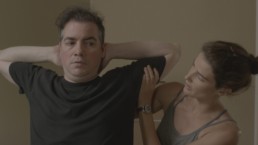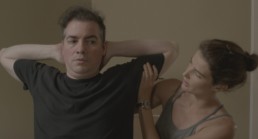Kevin Corrigan on ‘Results’
"I like the line that Danny has about being pudgy and mellow, and you know – that's good enough for me."
Even though his trademark melancholy demeanor suggests that he carries the weight of the world on his back on an almost daily basis, Kevin Corrigan doesn’t work out all that much. In his newest film, Results (in theaters this weekend), Corrigan stars as Danny, a recently divorced millionaire with money (and pounds) to burn, which half-motivates him to get in shape from a pair of gung-ho gym trainers (Guy Pearce and Cobie Smulders). Corrigan’s laissez-faire persona lends perfectly to Danny, who doesn’t mind pouring a drink and smoking a little pot after his barely-earned workouts, clashing wonderfully with his overly-enthusiastic trainers disciplined attitudes and exposing their over-attention to their body and not their hearts, which director Andrew Bujalski (Computer Chess) expertly tells in this relationships-driven comedy (Don’t call it a satire.) Speaking with Corrigan by phone, we found out more about the Indie veteran, including favorite comedies (among them, Taxi Driver), if he thinks about where his characters end up after the movie ends (he doesn’t), and resentment after seeing in-shape people leaving the gym (“Are you doing this just to make everyone else feel bad?”). We begin:
When did you shoot Results?
I think it was June, of 2014. So, not quite a year ago.
How did you become attached to the film?
How did I find the script… It came to me through Andrew (Bujalski). Andrew and I have been, associated for, a half dozen years or so, through another Austin-based filmmaker, Bob Byington (7 Chinese Brothers). We talked about working together… I’m a fan of Andrew’s. Anyways, that’s how it came to me. It sort of grew, organically, through my natural association with Andrew, through our social lives.
Andrew Bujalski writes his movies with such a singular, deadpan kind of humor- what films do you draw comedic inspiration from?
I’ll try not to give you a long-winded answer, I’m capable of that, I’ll try not to do that now.
I like “National Lampoon” comedies, from the classic era. But I also am a Cassavettes guy and Actor’s Studio School of “Accidental Comedy.” To the degree that Taxi Driver is a comedy, which, I never really looked at it that way until DeNiro decided to be a comedy star and said, “Well you know, Taxi Driver was a pretty funny movie.” And that’s true.
You might say that Cassavetes’ movies are comedies if you decide to look at them that way. But the thing that I always loved about those films was the humanity, or the “humanism” of those films, and when I read this script, the first time I read it, I thought it was a very straight-forward piece. A very accurate portrayal of people as they are, in real life.
I guess a couple of months went by, right before we were about to shoot it, I read it again, and it occurred to me that it was a satire. I didn’t notice that on the first reading. When I expressed this to Andrew, he was reluctant to agree with me, that it was a satire, and I understood his hesitancy, and I kept it to myself, that I thought it was a satire. I never played it for laughs. But I didn’t go into it without this perception that it was, funny.

Had you ever worked with, or met, your scene partners Guy Pearce and Cobie Smulders before making Results?
I had never worked with them, or even met them.
What was it like working with them?
Although Cobie and I never really talked about the sit-come genre, which, she had been on How I Met Your Mother, multi-camera, “situation” comedy…I’ve done a few of those. And I was aware of her experience with that stuff, and it never really figured into how we worked together. To my knowledge, she wasn’t approaching this movie, Results, with that in mind. We were playing it straight, pretty much.
Just as far as working with them, there was never a false note or a moment where I thought “This really isn’t working.” I just thought they were really good actors and we all kind of fell in with each other pretty naturally from the get-go, and we were just in character, and just played it the way it was written. And it worked.
I’d say Guy, I knew Guy’s work, a little bit more than Cobie’s work. I know I liked him a lot in the movie, The King’s Speech, he had a supporting role in that, he’s had lead roles in other films, but I know that I really liked him a lot in that. And, it was more or less a “wait and see” type thing. We’ll rehearse these scenes, we’ll work together, and we’ll see what happens. Guy and I did talk sometimes about acting, it turns out he’s a fan of DeNiro and Pacino, we had that in common. But again, it was, once we established all those things, they really had no bearing on what we did together. We just tried to honor the material we were given to do.
I walk down the street, and nine out of ten people, that I notice, as I walk down the street, are in way more shape than I am, and in way more shape than I’ll ever be. And I don’t know how they do it, or why they do it, and I start to think, “Why is it so important to them?”
Do you ever think about where the characters you play in films, such as Danny, end up after the movie ends?
(Thinking) I… I don’t really.
Laughter
Hopefully Danny continues on his “Power For Life” fitness regimen, and purges himself of all of his “ills,” he really seems to want to get back together with his ex…maybe it doesn’t…maybe he just opens a vintage guitar store. I don’t know.
Your character doesn’t seem to enjoy working out- what’s your own relationship with fitness?
Yeah, I guess, in that regard, I have something in common with the character–
Laughter
I’m sporadically interested in physical fitness. It’s always hard to, even when I feel like I’m vaguely serious about getting in shape, it’s still vague and I’m still non-committal. It’s of supreme effort to get up every day and try to achieve those goals. I guess the more specific the goal is, and the more help or motivation you have to do it, the more likely it is to get done.
But I just feel, I walk down the street, and nine out of ten people, that I notice, as I walk down the street, are in way more shape than I am, and in way more shape than I’ll ever be. And I don’t know how they do it, or why they do it, and I start to think, “Why is it so important to them?” People have memberships at gyms, and, you can always tell when someone’s coming from the gym…
Laughter
And there is kind of a, minor sense of, resentment, like, “Are you doing this just to make everyone else feel bad?” It just seems to me like… you know, acting is a very vain profession, or it can be. That’s the nature of it. But I think that would apply to any profession.
Where I live, in New York, there’s a lot of people in finance, and I gather it’s very important in that field to be competitive, to look better than the other people they’re in the mix with. It’s values, you have to do what you can to increase your own personal value if you want to stay afloat in whatever business you’re in.
And I think it’s possible to go overboard with that stuff. I don’t think it’s possible to overemphasize personal health, that’s certainly important. But when it comes to one-ups-manship, and “being better” than everyone else, that’s when I feel like… I like the line that Danny has about being pudgy and mellow and you know, that’s good enough for me. I’m not looking to beat anyone.
It is important to be healthy, and it’s also important to be nice. Nice to look nice, it’s more important to be nice. That’s my philosophy at the end of the day.
You have a busy year ahead of you, with Results and [Terrence Malick’s] Knight of Cups coming out later this year. What else can we expect to see you in?
I can tell you, there’s a show coming out, I guess in August, it’s called Public Morals, and it’s from, Edward Burns created the show, Steven Spielberg is the Executive Producer, and it’s a period piece set in New York about the Public Morals division of the NYPD in the late sixties, mid to late sixties, and I played a part in that. It’s cops and robbers, basically. Sort of loosely based on, if not real people, the real sort of scene in Manhattan, in New York at the time, regarding the Irish mob. So I ended up in that production on the Irish mob side of things.
I must say, I had fun working on that, I was proud of what I did on it, I had a really good part to play, and I can say that I have that coming out.
Any last words that you’d like people to know about Results before checking it out?
Well, a lot of people have seen it already, and, it is what it is. I don’t know… it’s a comedy. It’s about relationships. Someone made a comparison to Broadcast News, just as far as the relationship side of it, the three people…
I’d say go into it with an open mind.
Ryan Rojas
Ryan is the editorial manager of Cinemacy, which he co-runs with his older sister, Morgan. Ryan is a member of the Hollywood Critics Association. Ryan's favorite films include 2001: A Space Odyssey, The Social Network, and The Master.



